

The Columbia Basin Public Information Network
by Ronda Evans and Bruce McComb
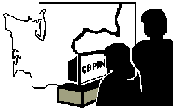
The Columbia Basin Public Information Network (CBPIN)
is a RECA Foundation program since 1994. Founding members have
created a sustainable Community Network known as The Columbia
Free-Net (TCFN). Franklin County provides dial-up phone lines,
space, power and networking expertise; BOSS Internet Group (a
commercial ISP) provides free Internet service; and the Mid-Columbia
Library (MCL) System provides a wide area network connecting 11
sites in 3 counties, with free local dial up access. The MCL and
the TCFN are interconnected so that citizens can travel freely
from one system to the other. The Columbia Free-Net provides free
e-mail to all residents, community information and resources,
and free web pages for non-commercial organizations.

The Columbia Free-Net (TCFN) reaches throughout four counties
providing community information and free e-mail services. The
library has seen an increase of 20% participation yearly since
Internet access has been provided. The Free-Net has seen over
4,000 new users.
Community Technology Centers: Affiliated with the international
Community Technology Centers' Network (CTCNet), 5 CTCs
were established in 1997. Each site was selected based upon their
commitment to provide services to a targeted [have-not] population,
providing staff, support, space, and commitment to integrate the
computer technology centers into their current programs.
Jeannie Enriquez, Parent Coordinator and Director of Family Learning Center, teaches classes in adult literacy and English as a Second Language. Learning is enhanced through the computers and the Internet. Parents of Amistad students are provided educational resources to help teach their children.
A 28 computer multimedia center is never empty. Teachers use
Teach Web, web pages that use existing resources to help children
learn to read and write. The lab is used during the day by Amistad
classes and by adults/families at night.
The low income housing project just opened a three-computer lab, with scanner, printer, and CDs for all ages. HeadStart students, the After School Homework program, residents of Kennewick Housing Authority, and participants in the Family Self Sufficiency program use the computer lab.
Adaptive computer equipment and software is available for the sight impaired to learn computers and the Internet. Some have never used a computer while others have been using The Columbia Free-Net for years.
Washington State Migrant Council partnered
with RECA Foundation to win the CTCNet and Apple Computers grant to
develop an Employment and Training Center during the day, and
public access computer lab after hours in Pasco. WSMC assists people
on public assistant to learn computer job skills, computer training
and Internet use.
CBPIN Computer Recycling Center provides computers and
training to the Community Technology Centers and low-income families.
Families, such as participants in the Family Self Sufficiency
Programs, earn their computers through community service as volunteers
in the CTCs, information providers for the Free-Net, Webmasters,
and mentors.
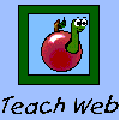
Teach Web was developed by the RECA Foundation using Columbia Industries' Youth Hires during the Summer of 1997. The elementary teachers provided the themes for the '97/'98 school year. Youth Hires then researched the WWW to find pertinent sites. The result: a place where "kids" of all ages can use the Internet to enhance their knowledge. Children and parents can use the site outside of normal school hours.
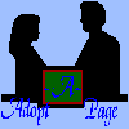
Space on The Columbia Free-Net server is available for not-for-profit
organizations free of charge. The Adopt-a-Page program is designed
to support the design and maintenance of the WWW pages for those
organizations.
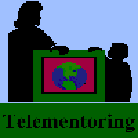
Mentoring programs come in many shapes and sizes: adults mentoring
families; Adults mentoring youth and children; service groups
mentoring youth organizations; technical people mentoring non-technical
people. Telementoring enhances more traditional mentoring programs
by using the telecommunications media.
phone: 509.543-2910
Dream became reality for RECA Foundation
(see
http://www.tcfn.org/progress.htm for the complete text)
"The year is 1992, a small group of "dreamers,"
with little money but lots of enthusiasm start a nonprofit organization
with a charter of "Community Networking." And the RECA
Foundation is born."
 Co-Founders: Ronda
Evans seen with
two 1st graders using the Internet to learn to read.
Co-Founders: Ronda
Evans seen with
two 1st graders using the Internet to learn to read.
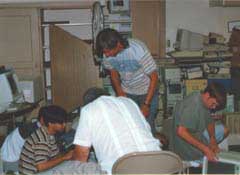 Bruce McComb seen with 1997
Youth Hires that
helped with recycled computers and designing Teach Web.
Bruce McComb seen with 1997
Youth Hires that
helped with recycled computers and designing Teach Web.
Many First's for the RECA Foundation
- 1st Free-Net in the State of Washington
- 1st CTC in the State of Washington
- 1st Free-Net to use a non-Unix system
- 1st Non-Profit Board conducted on-line
The Columbia Free-Net is a sustainable community network. In-kind
services, volunteers, donated equipment & software, and
even a little funding have made it happen. Truly a grassroots,
community-driven network, the first 3 years of service were provided
on an 80386SX based machine—even providing text based Internet
the last of these years. Today the TCFN runs on an 80486DX25 and
is in bad need of an upgrade. A separate Web server is donated
by a local ISP, while technical support and dial-up phone lines
are provided by Franklin County. Text based WWW is provided in
partnership with the local 11 branch public library.
A sustainable Community Network, 5 Community Technology Centers,
a Computer Recycling Center, local Our Town host, Teach Web, Adopt
- a - Page, Telementoring projects.
WHERE TO NOW?
- Encourage the development of a Regional (or perhaps international) computer recycling facility. Locating a business to recycle junked PCs that contain lead, radium, mercury, cadmium and other hazardous materials. While individual machines present few problems, the 25 million computers disposed of worldwide from 1991 to 1995 are another story.
- "Community Asset Mapping" a process of focusing on strengths, not problems. The process maps individual skills & assets, identifies organization's service assets, identifies facilities for space and services, and connects them together. The power and effectiveness as a neighborhood and community are multiplied many fold. We're working to make the process self-directed through technology (see http://www.tcfn.org/mapping).
- A Multi-Media Disabilities Resource Center. Where families, friends, and service agency staff can come to learn about the most current technologies to help the disabled.
- A Migrant Worker Super Highway to connect Community Networks and Community Technology Centers along the Migrant Trail.
- Expanding The Columbia Free-net to surrounding counties that don't have community networks or Community Technology Centers.
The year is 1997. A small group of "dreamers" with little money—but lots of enthusiasm—are making community networking happen in the Columbia Basin. In a very different place and time, Anne Frank wrote "How wonderful it is that nobody need wait a single moment before starting to improve the world." Don't wait a single moment—dream a little—become part of your community network and/or your community technology center.

Community Technology Center Review, January 1998
Table of Contents
